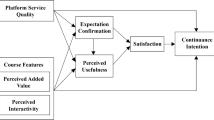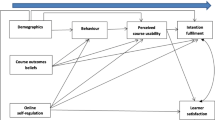Abstract
The perception of e-learning and online courses by students can provide valuable insights into course design and user experience. The online landscape is changing and students experience a growing variety of digital educational materials. One of the experiences are expectations (ex-ante perception) and consumption experience (ex-post perception). They can be evaluated individually as well as in relation to each other. Educational data is typically multivariate and of high dimensionality. The implementation of online courses is often costly, the experimental setup is complex, and management needs technical expertise. For this research, an undergraduate-level online course was set up, which was taken and assessed by students. Using ex-ante and ex-post questionnaire evaluations, a shift in perception of several online course features could be observed. The data was analyzed using the Kano method to measure student satisfaction. Attitudes towards 12 features, including ease of use, multimedia inclusion, account settings, and other specific features were gathered before and after taking the online course. The results of the macro shift (expectations vs. consumption experience) and micro shift (individual student’s shift within a requirement) were compared. Findings are discussed and implications for online course preparation and design are presented.
Access this chapter
Tax calculation will be finalised at checkout
Purchases are for personal use only
Similar content being viewed by others
Notes
- 1.
The website framework and plugins can be found at the following URLs: https://wordpress.org, https://www.learndash.com, and https://memberpress.com.
- 2.
From several questions written by this student in the open-ended question section, the authors could infer an English comprehension of basic rather than none.
References
Basfirinci, C., Mitra, A.: A cross cultural investigation of airlines service quality through integration of servqual and the kano model. J. Air Transp. Manag. 42, 239–248 (2015). https://doi.org/10.1016/j.jairtraman.2014.11.005
Bearden, W.O., Netemeyer, R.G., Haws, K.L. (eds.): Handbook of Marketing Scales - Multi-Item Measures for Marketing and Consumer Behavior Research. SAGE Publishing, New York (2010)
Becher, T.: The significance of disciplinary differences. Stud. High. Educ. 19(2), 151–161 (1994). https://doi.org/10.1080/03075079412331382007
Berger, C., Blauth, R.E., Boger, D.: Kano’s methods for understanding customer-defined quality. Cent. Qual. Manag. J. 2, 3–36 (1993)
Chaudha, A., Jain, R., Singh, A.R., Mishra, P.K.: Integration of kano’s model into quality function deployment (QFD). Int. J. Adv. Manuf. Technol. 53(5), 689–698 (2011). https://doi.org/10.1007/s00170-010-2867-0
Chen, L.H., Kuo, Y.F.: Understanding e-learning service quality of a commercial bank by using kano’s model. Total Qual. Manag. Bus. Excellence 22(1), 99–116 (2011). https://doi.org/10.1080/14783363.2010.532345
Dominici, G., Palumbo, F.: How to build an e-learning product: factors for student/customer satisfaction. Bus. Horiz. 56(1), 87–96 (2013). https://doi.org/10.1016/j.bushor.2012.09.011
Kano, N., Seraku, N., Takahashi, F., ichi Tsuji, S.: Attractive quality and must-be quality. J. Jpn. Soc. Qual. Control 14(2), 147–156 (1984). https://doi.org/10.20684/quality.14.2_147
Katai, Z.: Promoting computational thinking of both sciences- and humanities-oriented students: an instructional and motivational design perspective. Educ. Tech. Res. Dev. 68(5), 2239–2261 (2020). https://doi.org/10.1007/s11423-020-09766-5
Chen, L.H., Lin, H. C.: Integrating kano’s model into e-learning satisfaction. In: 2007 IEEE International Conference on Industrial Engineering and Engineering Management, pp. 297–301 (2007). https://doi.org/10.1109/IEEM.2007.4419199
Mikulić, J., Prebežac, D.: A critical review of techniques for classifying quality attributes in the kano model. Manag. Serv. Qual.: Int. J. 21(1), 46–66 (2011). https://doi.org/10.1108/09604521111100243
Parasuraman, A., Zeithaml, V.A., Berry, L.: Servqual: a multiple-item scale for measuring consumer perceptions of service quality. J. Retail. 64, 12–40 (1988)
Parasuraman, A., Zeithaml, V.A., Malhotra, A.: ES-QUAL: a multiple-item scale for assessing electronic service quality. J. Serv. Res. 7(3), 213–233 (2005). https://doi.org/10.1177/1094670504271156
Quesenberry, K.A., Saewitz, D., Kantrowitz, S.: Blogging in the classroom: using wordpress blogs with buddypress plugin as a learning tool. J. Advertising Educ. 18(2), 5–17 (2014). https://doi.org/10.1177/109804821401800203
Rodgers, A.R., Puterbaugh, M.: Digital badges and library instructional programs: academic library case study. J. Electron. Resour. Librariansh. 29(4), 236–244 (2017). https://doi.org/10.1080/1941126X.2017.1378542
Selim, H.M.: Critical success factors for e-learning acceptance: confirmatory factor models. Comput. Educ. 49(2), 396–413 (2007). https://doi.org/10.1016/j.compedu.2005.09.004
Selvi, K.: Motivating factors in online courses. Proc.-Soc. Behav. Sci. 2(2), 819–824 (2010). https://doi.org/10.1016/j.sbspro.2010.03.110
Sun, P.C., Tsai, R.J., Finger, G., Chen, Y.Y., Yeh, D.: What drives a successful e-learning? an empirical investigation of the critical factors influencing learner satisfaction. Comput. Educ. 50(4), 1183–1202 (2008). https://doi.org/10.1016/j.compedu.2006.11.007
Violante, M.G., Vezzetti, E.: Virtual interactive e-learning application: an evaluation of the student satisfaction. Comput. Appl. Eng. Educ. 23(1), 72–91 (2015). https://doi.org/10.1002/cae.21580
Wang, Y.S., Bauk, S., Šćepanović, S., Kopp, M.: Estimating students’ satisfaction with web based learning system in blended learning environment. Education Research International 2014 (2014). https://doi.org/10.1155/2014/731720
Wang, Y.S., Wang, H.Y., Shee, D.Y.: Measuring e-learning systems success in an organizational context: scale development and validation. Comput. Hum. Behav. 23(4), 1792–1808 (2007). https://doi.org/10.1016/j.chb.2005.10.006
Acknowledgements
This research was supported by JSPS KAKENHI Grant Number 22K02874.
Author information
Authors and Affiliations
Corresponding author
Editor information
Editors and Affiliations
Rights and permissions
Copyright information
© 2022 The Author(s), under exclusive license to Springer Nature Switzerland AG
About this paper
Cite this paper
Marutschke, D.M., Hayashi, Y. (2022). Kano Model-Based Macro and Micro Shift in Feature Perception of Short-Term Online Courses. In: Wong, LH., Hayashi, Y., Collazos, C.A., Alvarez, C., Zurita, G., Baloian, N. (eds) Collaboration Technologies and Social Computing. CollabTech 2022. Lecture Notes in Computer Science, vol 13632. Springer, Cham. https://doi.org/10.1007/978-3-031-20218-6_8
Download citation
DOI: https://doi.org/10.1007/978-3-031-20218-6_8
Published:
Publisher Name: Springer, Cham
Print ISBN: 978-3-031-20217-9
Online ISBN: 978-3-031-20218-6
eBook Packages: Computer ScienceComputer Science (R0)




